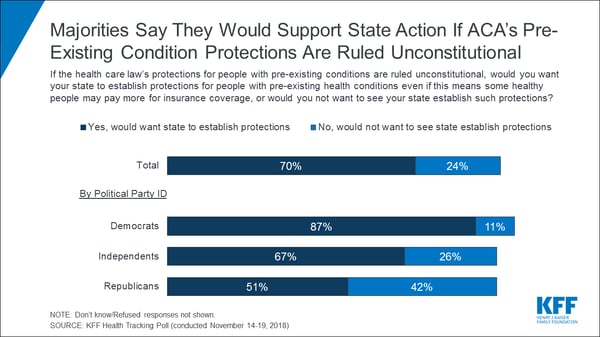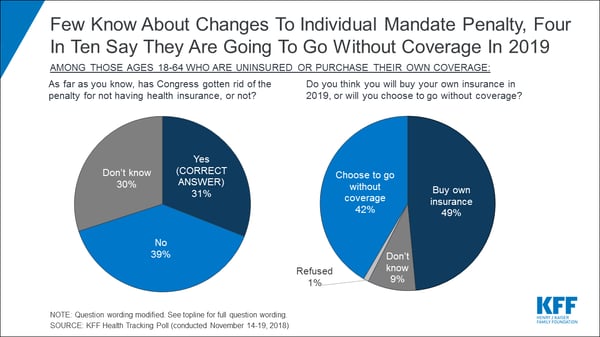|
Just Released
|
||
|
Bipartisan Majorities Support Trump Administration’s Push to Get Drug
Prices in Advertisements, Even after Hearing Counter-Arguments
Most Oppose Other Actions that Could
Eliminate ACA Pre-Existing Condition Protections and Expand Employer
Exemptions to Birth Control Mandate
Only 1 in 4 Potential Marketplace
Customers Know When ACA Open Enrollment Ends; 1 in 5 Say They Would Buy a
Short-Term Plan
A large majority of the public backs the Trump
Administration’s initiative to require prescription drug advertisements to
include information about prices, but fewer support other administrative
actions involving pre-existing conditions and contraception coverage, the latest KFF Health Tracking Poll finds.
Requiring drugmakers to include price information
in their advertisements is a widely discussed element of the Trump
Administration’s plan to address high drug costs. Three-fourths (77%) favor it, and most (53%) continue to favor it, even
after being told that the proposal could confuse consumers who may pay
different prices for the same drug based on their insurance.
In other areas, the
public shows less support for health policies promoted by the Trump
administration, including its decision in June not to defend the Affordable
Care Act’s protections for people with pre-existing conditions as part of a
pending lawsuit filed by conservative state attorneys general.
Most Americans say it
is “very important” that the provisions in the ACA that prevent insurance
companies from denying coverage (65%) or charging more (62%) to people with
pre-existing conditions remain law, even after hearing that these protections
may have led to increased insurance costs for some healthy people.
If the courts throw
out those protections, a majority (70%) say they would want their state to
establish such protections, even if it meant healthy people would pay more.
This includes half (51%) of Republicans, as well as majorities of Democrats
(87%) and independents (67%).
More recently, the Trump Administration issued
final regulations that expand the exemptions for employers that do not want
to cover the cost of contraception in their employees’ health plans because
of religious or moral reasons. Most (57%) of the public – including most
women (63%) – say they oppose such exemptions.
Few Potential Marketplace Customers Know
When Open Enrollment Ends
The poll also assesses
the public’s awareness about the ongoing Affordable Care Act open enrollment
period, during which people who either buy their own health insurance or are
uninsured can sign up for a plan through their state’s marketplace.
Open enrollment ends Dec. 15 in states that rely
on healthcare.gov, but runs longer in some states that use their own
marketplace.
The poll finds most potential marketplace
customers – adults under age 65 who are either uninsured or buy their own
insurance – do not know when open enrollment ends in their state. About one
in four (24%) know the correct date, while most others (61%) say they do not
know when open enrollment ends. Smaller shares give a variety of incorrect
answers.
The poll also gauges
how two policy changes could affect open enrollment this year: Congress
eliminated the tax penalty for people who don’t obtain health coverage
effective next year, though three in 10 (31%) of those under age 65 who are
uninsured or buy their own coverage are aware that the penalty no longer
exists. About half (49%) of potential marketplace customers say they plan to
buy coverage this year. Nearly as many (42%) say they will go without
coverage.
The Trump
Administration has taken steps to expand access to short-term health plans,
which can cost less than ACA marketplace plans but can discriminate against
people with pre-existing conditions, offer fewer benefits, and provide less
generous coverage. About one in five (21%) of potential marketplace customers
say they would buy a short-term plan if given the opportunity.
Health
Care Is Among Public’s Top Priority for Congress
Following midterm
elections where health care played a key role, the poll finds Americans now
are as likely to cite immigration and border security (21%) as health care
(20%) when asked to name the issue that they most want the next Congress to
address.
These two issues
reflect the different partisan priorities. Immigration/border security is by
far the issue most often named by Republicans (41%), while Democrats most
often name health care (27%). Independents are about equally likely to cite
the two issues (immigration 22%, health 21%).
When asked about priorities within health care
they want the next Congress to address, a larger share of Americans offer
issues around affordability and costs (19%) than other issues such as the
future of the Affordable Care Act (10%), Medicare (9%), and health
coverage/insurance for everyone (5%).
Democrats will take
control of the House in January, resulting in divided government in
Washington for the first time under President Trump. Most Democrats say the
top priorities for the Democratic House majority should be oversight of the
Trump Administration’s actions on health care, education, and the environment
(77%), and working to enact new laws to address the major problems facing the
country (67%). A smaller majority (58%) say investigating corruption within
the Trump Administration should be a top priority.
In Non-Expansion States, Most Favor
Expanding Medicaid to More Low-Income Adults
After successful
ballot initiatives in Idaho, Nebraska and Utah to expand those states’ Medicaid
programs to low-income adults through the ACA, there are 14 states that have
not approved the ACA’s Medicaid expansion.
The poll finds a
majority of residents (59%) in those 14 states favor expanding their Medicaid
programs to cover more low-income people, while a third (34%) say they want
to keep the state’s program as is. A bare majority (51%) across those states
also say that they would favor a ballot initiative to expand Medicaid in
their states if their governors and state legislatures choose not to expand
the program.
Designed and analyzed
by public opinion researchers at KFF, the poll was conducted from November
14-18, 2018 among a nationally representative random digit dial telephone
sample of 1,201 adults. Interviews were conducted in English and Spanish by
landline (291) and cell phone (910). The margin of sampling error is plus or
minus 3 percentage points for the
full sample. For results based on subgroups, the margin of sampling error may
be higher.
Filling
the need for trusted information on national health issues, KFF
(the Kaiser Family Foundation) is a nonprofit organization based in San
Francisco, California.
|
||
|
||
To be a Medicare Agent's source of information on topics affecting the agent and their business, and most importantly, their clientele, is the intention of this site. Sourced from various means rooted in the health insurance industry - insurance carriers, governmental agencies, and industry news agencies, this is aimed as a resource of varying viewpoints to spark critical thought and discussion. We welcome your contributions.
Wednesday, November 28, 2018
Bipartisan Majorities Support Trump Administration’s Push to Get Drug Prices in Advertisements, Even after Hearing Counter-Arguments
Subscribe to:
Post Comments (Atom)



No comments:
Post a Comment